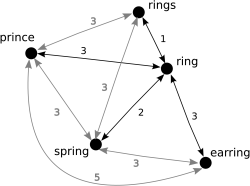-
Notifications
You must be signed in to change notification settings - Fork 450
New issue
Have a question about this project? Sign up for a free GitHub account to open an issue and contact its maintainers and the community.
By clicking “Sign up for GitHub”, you agree to our terms of service and privacy statement. We’ll occasionally send you account related emails.
Already on GitHub? Sign in to your account
The Global Brain - the roadmap #7064
Comments
Passive Personalization: learn through consumptionIts all about the effortless and frictionless experience. Interesting viewpoint of a two-sides market and the removal of explicitly following people in TikTok. Our global brain in the early stages should yield an explicit list of #HashTags the users is interested in. These hashtags defines the social graph and also interest. The sorted list of #HashTags could be the user experience paradigm to make your personalised search profile explicit. This gives the user trust in Tribler and trust in the machine learning capabilities. It also enables the user to correct mistakes. A single graph: combine the trust graph with the relevance graph of interesting content. |
Dempster-Shafer ClassifierCurrent federated machine learning frameworks lack the general reasoning, attack-resilience, and intelligence for the global brain. Epistemic AI might be the theoretical grounding we need for reasoning about trust, taste, truth, knowledge, and contested concepts. "Although it is a major step in NLP research, GPT-3.5 does not fully contain all the ideal properties envisaged by many NLP researchers (including AI2). The important property that GPT-3.5 does not have is formal reasoning." "Dempster-Shafer Theory [DST][GS76][GS90] is a mathematical theory of evidence, offers an alternative to traditional probabilistic theory for the mathematical representation of uncertainty. The significant innovation of this framework is that it allows for the allocation of a probability mass to sets or intervals as opposed to mutually exclusive singletons. In contrast, Bayesian inference requires some a priori knowledge and is unable to assign a probability to ignorance." COPIED "In this paper, we introduce a concept called epistemic deep learning based on the random-set interpretation of belief functions to model epistemic learning in deep neural networks. We propose a novel random-set convolutional neural network for classification that produces scores for sets of classes by learning set-valued ground truth representations. We evaluate different formulations of entropy and distance measures for belief functions as viable loss functions for these random-set networks." TUDelft is part of the epistemic AI EU project to study this work, https://starlab.ewi.tudelft.nl/ |
Towards a global brain for humanityHuman knowledge is expanding at a rapid rate. Inspired by initiatives such as Linux, Wikipedia, and Bitcoin we present our Internet-deployed global brain prototype. Our work is based on 24 years of prototyping cardinal components such as the distributed reputation, trust framework, secure content discovery, resource mining, and ...
A+ publication Venue Conference on Digital Libraries (JCDL) Ongoing related work to build upon:
Global Brain: Minimal Viable Product
Scientific discovery automation including knowledge synthesis, benchmarking, close-loop discovery. |


1996 fantasies: The World-Wide Web as a Super-Brain: from metaphor to model in: Cybernetics and Systems plus Algorithms for the self-organization of distributed, multi-user networks. Possible application to the future world wide web
1999: first code: "Open Information Pools" in: USENIX conference by Tribler team
https://en.wikipedia.org/wiki/Global_brain
Growth strategy (e.g. megalomania)
Offer value beyond the offerings of the core Internet protocols or Big Tech.
First running code (2009)
By Leonardo

Prior roadmap (2021)
Prior roadmap with a markdown focus and channels. We learned that channels requires permissions, tags are a superior permissionless method to achieve content discoverability. Key steps:
Tribler: The Global Brain in Web3
Many parties try to control The Internet. We worked now for 17 years and 5 months on technology which provides ordinary Internet users with full self-sovereign control. The goal is to design a sustainable, self-governing, self-funded, and long-enduring ecosystem. Web3 is the emerging decentralised movement for which we aim to design the architecture, first realisation, and pioneering community. Ongoing prototyping can be found here:

Our efforts are deeply political. We aim to boost the power of citizens and reduce the power of all others. Wikipedia wisdom: "a more distributed form of decision-making would decrease the power of governments, corporations or political leaders, thus increasing democratic participation and reducing the dangers of totalitarian control", [ref]
Scientific and technological challenges
Related work: the global brain dream is old, attracts hippies, and fraudsters alike.


Related work by Cornell University. Abandoned in 2008, at "peak P2P" era. Their Cubit search engine looks and operates fully, but looks very 2008.
Their knowledge graph is designed for an Internet filled with gentle and non-frauding strangers. No spam, misinformation, poisoning or fraud measures are implemented (see their nice documentation):
We realising a true Cyberpunk world. Goal: Cyberpunk 2052. Our radical experiments with online democracy have replaced all analog governments.
The text was updated successfully, but these errors were encountered: